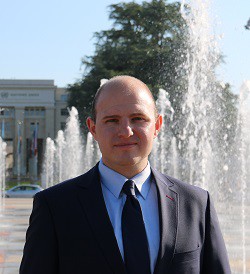On March 26, ADHRB associate Michael Payne delivered an oral intervention at the 28th session of the United Nations Human Rights Council in Geneva under Item 10. Please continue reading for full remarks or click here to download a PDF.
الرجاء الضغط هنا لقراءة هذه الرسالة باللغة العربي
Mr. President,
Recognizing the importance of technical assistance and capacity building for ensuring the promotion and protection of human rights worldwide, Americans for Democracy and Human Rights in Bahrain emphasize the need for Member States to reaffirm their commitments in this area. We call special attention to situations in which States have yet to implement recommendations made by the Council and by different procedural mandates.
This type of situation can be observed in Saudi Arabia, where a visit by the Special Rapporteur on the Independence of Judges and Lawyers in 2002 recognized several issues on the impartiality and general procedural practices of the Saudi judicial system. Despite detailed recommendations for Saudi governance to administer justice transparently and independently, including recommendations to repeal laws allowing prolonged incommunicado detention and closed court hearings, the government of Saudi Arabia has made little effort to concretely address these concerns.
Instead, we have witnessed a judicial system that continues to act under government influence and control. This is facilitated through an appointment of judges by royal order which considerably minimizes the degree to which the judiciary can act independently from the King and other high ranking officials. The consequence of this has been reflected in the arbitrary trials of various human rights advocates including Mohammad al-Wadani, Tawfeeq al-Amer, Raif Badawi and Waleed Abu al-Khair. Such cases show an unacceptable lack of advancement in areas that should be seeing results from capacity building and technical assistance programmes. This lack of progress is particularly disappointing since the signing of Saudi Arabia’s Memorandum of Understanding with the OHCHR in 2012.
We therefore call on Saudi Arabia to demonstrate its commitment to a program of technical capacity building with OHCHR by carrying out substantive and accelerated human rights reforms in line with the 2002 recommendations of the SR on the independence of judges and lawyers.
Thank you.





